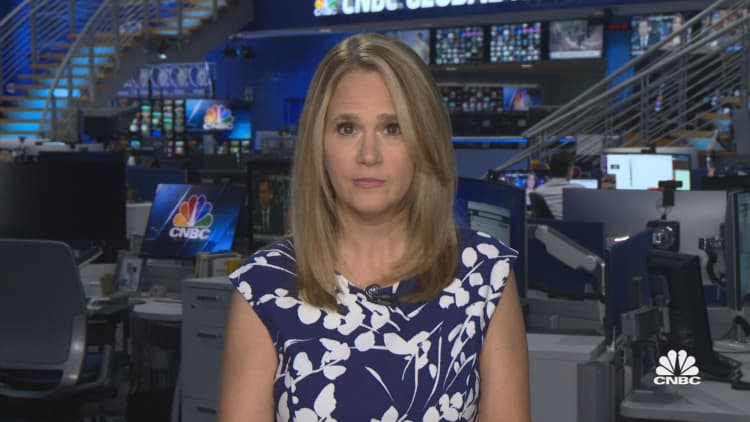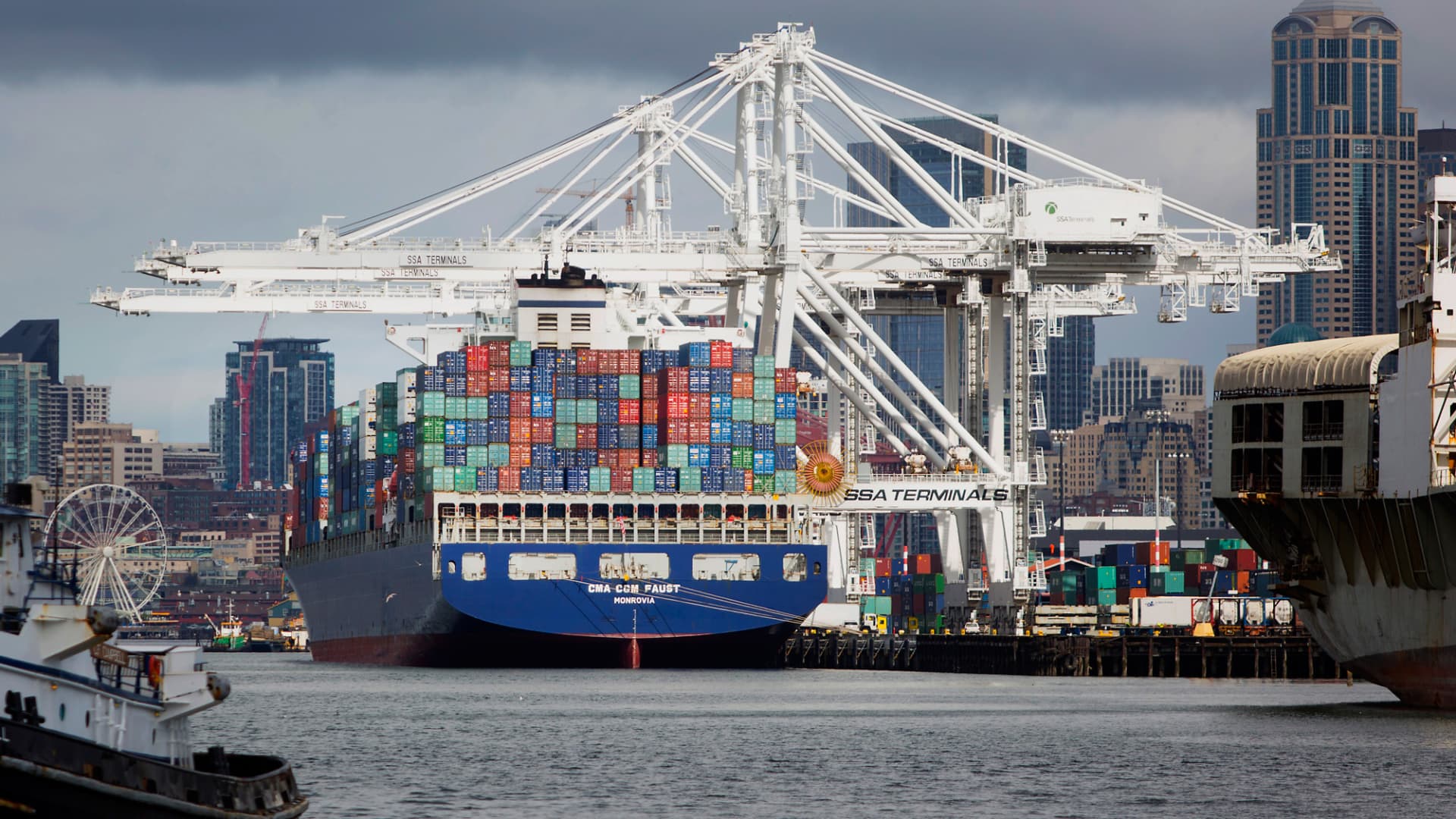
Two containerships originally bound for the Port of Vancouver are changing course and have been diverted to the Port of Seattle, according to VesselsValue tracking data, as labor strikes at West Coast ports in Canada stretch into their sixth day.
The containerships that have been diverted are identified as the MSC Sara Elena and the OOCL San Francisco. It’s the first of what could be widespread rerouting of ships, delaying planned arrivals and straining supply chains right at the beginning of peak season when holiday and back-to-school items are coming in.
The strike could lead to congestion in these ports with longshoremen unable to unload vessels. Congestion can turn into backlogs and lead to delayed pickups from terminals, which can then lead to late fees that are often passed on to consumers — similar to what occurred during the pandemic.
The re-routing of containers also adds days to the delivery of product. For the auto industry which runs on lean just in time schedules, these delays can impact production.
The distance between the Port of Vancouver and the Port of Seattle is a little over a half-day’s trip traveling at typical speeds.
New data from MarineTraffic shows 15 containerships bound for Vancouver and 9 containerships bound for Prince Rupert. The containers that would be moved by these combined vessels is equal to $10.7 billion.
The Port of Vancouver and Port of Prince Rupert are popular destinations for U.S. trade because these ports are among the major ports of call for goods arriving from Asia. Some logistics managers have told CNBC that rail service out of those ports is a lot faster than going through the port of Seattle or Tacoma.
ITS Logistics told CNBC it has containers on the OOCL San Francisco. They were scheduled to arrive at the Port of Vancouver on July 3 and were then destined by rail for Memphis. Paul Brashier, vice president of drayage and intermodal at ITS Logistics, said clients are now looking for alternate American ports.
“Right now we are advising all clients with freight that was booked to Vancouver or Prince Rupert to work with their booking agents to track the US ports of call of the vessels that their containers are on and see if the ocean liners will allow reconsigment (switching container final destination) to a US port,” Brashier said.
Many ITS clients have requested a change in container destination and are waiting to see if the ocean carriers will accept that change. The ocean carriers are the final arbiter in any container destination change. Usually, you can change a container’s destination five days prior to a vessel docking.
The Canadian ports normally process goods bound for the United States ranging from auto and manufacturing parts to footwear and apparel. Trade organizations including the American Apparel and Footwear Association and the National Retail Federation have told CNBC they urge the Canadian government to help keep parties at the negotiating table.
Both the British Columbia Maritime Employers Association and the International Longshore and Warehouse Union Canada chapter walked away from labor negotiations earlier this week, each blaming the other for the breakdown in talks.
Talks still paused
ILWU Canada released a scathing statement Thursday, accusing the British Columbia Maritime Employers Association of a smear campaign and demanding to get back to the mediation table.
“The reality is, our people do hard work under difficult, often dangerous conditions, and they kept Canada’s economy moving through the worst of the pandemic,” said ILWU Canada President Rob Ashton. “That’s a long ways from the picture the employer wants to paint. It can be a good living, but it takes years of sacrifice to get there, and it’s still hard work.”
Ashton listed several points supporting the union’s position, including sporadic income for waterfront workers resulting from on-call work systems; inconsistent hours since many workers are dispatched on a day-to-day basis; and high rates of injury, including several deaths recorded in recent years.
The ILWU Canada president also said higher pay rates often require working night shifts, six or seven days a week.
“Our members’ families are facing spiraling food bills, housing costs, and interest rates. All we’re asking from employers is to share some of the wealth our labor is creating for them through a fair, reasonable increase in wages, and to ensure our members can continue to do that work with respect and dignity,” Ashton said.
BCMEA said in a statement to CNBC Thursday that negotiations are still paused.
“We continue to be ready to return to the table at a moment’s notice, assuming ILWU Canada is prepared to put forward a reasonable proposal, particularly on their demand to aggressively expand ILWU jurisdiction over maintenance work on the terminal,” the group said.
Canadian Labor Minister Seamus O’Regan Jr. who has been urging both sides to come back to the table to negotiate, is set to speak with acting U.S. Labor Secretary Julie Su Thursday evening about the impact of the strike on the North American supply chain.
With the Canadian Parliament out of session, the governing body would need to recall members in order to intervene. Even with remote voting, a quorum for in-person voting also needs to be met on any measure.
U.S. union workers
The diversion of the shipping containers raises the question of whether works at American ports will step in and metaphorically cross the picket line.
The strike at the Canadian West Coast ports has been met with support from both the ILWU West Coast U.S. Chapter and the International Longshoremen’s Association (ILA).
The ILA, the largest union of maritime workers in North America, representing the workers at ports on the Atlantic and Gulf Coasts, Great Lakes, major U.S. rivers, Puerto Rico and Eastern Canada, said in a statement that no diverted cargo from striking ports would be accepted.
The ILWU U.S. West Coast chapter declined to comment to CNBC about whether its members plan on working any of the diverted vessels. Earlier this week ILWU U.S. West Coast chapter President Willie Adams met with his Canadian counterpart, Ashton, and the ILWU in its past statements has said it supports their union brothers in Canada.
The first of the diverted containerships is expected at the Port of Seattle on July 10, according to port authorities.
The Canadian ports handle approximately $225 billion in cargo each year, with items spanning home goods, electronics, and apparel transported by rail. Approximately 15% of consumer trade going through the Port of Vancouver is headed to or coming from the U.S., according to port authority data. Around two-thirds of containerized import volume going to the Port of Prince Rupert are headed to the U.S., port data shows.
Three Class 1 railways operate at these ports: CN, Canadian Pacific, and BNSF, a subsidiary of Berkshire Hathaway.


